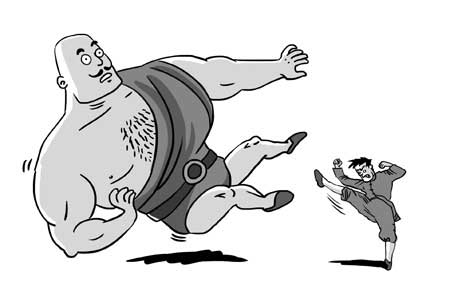Filmmakers should know kung fu isn't that superior
 |
|
[By Liu Rui/Global Times] |
Martial arts movies always do well at the Chinese box office. Films like Yip Man I and II, Fearless (a movie about turn-of-the-20th century kung fu legend Huo Yuanjia), and Legend of the Fist: the Return of Chen Zhen all brought in strong box office.
One of the recurring themes of these films is the superiority of Chinese martial arts to Western fighting.
There's usually a scene in which a large, clumsy foreigner is beaten by a nimble and skilled Chinese martial arts master. There's more than a touch of xenophobia in these depictions, as the graceless foreigner is humiliated by the local hero.
Kung fu movies were invented in the 1950s in Hong Kong, and then enjoyed their golden age between the 1970s and the early 1990s. The rest of China took to the genre with enthusiasm in the 1980s, when Hong Kong cinema began to reach the mainland, and the mainland directors were quick to adopt the forms and stereotypes of Hong Kong movies.
Huo Yuanjia and Huang Feihong, both about real Chinese martial arts figures, were typical mainland movies of the period. And, yes, both include an entirely fictitious scene in which the eponymous hero soundly trounces a Western boxer.
At the time, memories of the "century of humiliation" were still strong. China was a relatively weak and backward country that couldn't compete with the West on any term but fiction. Seeing a martial arts hero defeat a Westerner cheered people up, asserting the superiority of a fundamentally Chinese tradition, kung fu, in a Western dominated world.
In Hong Kong, Chinese triumph over Western arrogance helped people deal with the legacy of colonialism and the often racist attitude of expatriates in Hong Kong toward the local population.
But times have changed, and today Chinese have a more objective understanding of other countries, and a greater pride in their own national strength.
Cross-cultural cooperation is the order of the day. But the directors of Chinese action movies are still obsessed with kung fu, and with the same old stereotypes of confronting the West.
 0
0 






